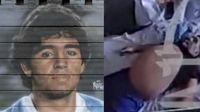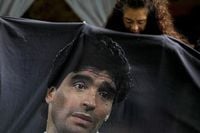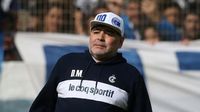In a gripping trial unfolding in Buenos Aires, evidence has emerged that football legend Diego Maradona likely suffered for hours before his death, as seven medical professionals face accusations of culpable homicide. Maradona, who passed away on November 25, 2020, at the age of 60, was recovering at home from brain surgery when he succumbed to cardiac arrest. The court has heard harrowing details about his final days, described by prosecutors as a "horror theatre."
During the trial, forensic expert Carlos Mauricio Casinelli testified that Maradona died in "agony" for at least 12 hours before his death. He revealed that the football icon's heart weighed 503 grams—almost double the normal size—and was "completely covered in fat and blood clots," indicating a prolonged suffering. This condition, according to Casinelli, resulted from acute pulmonary edema secondary to congestive heart failure, with fluid accumulating in Maradona's lungs for at least ten days prior to his passing.
"The heart was completely covered in fat and blood clots, which indicate agony," Casinelli explained. He noted that any competent medical professional should have recognized the symptoms days earlier. Maradona's body showed signs of significant distress, including severe swelling in his face and abdomen, which witnesses had reported in the days leading up to his death.
Among the accused are Leopoldo Luque, Maradona's personal physician, and psychiatrist Agustina Cosachov, who prescribed medication that Maradona continued to take until his death. The defendants are charged with "homicide with possible intent," meaning they allegedly acted in a way that could foreseeably lead to Maradona's death. If convicted, they face prison sentences ranging from eight to 25 years.
As the trial commenced on March 25, 2025, it has drawn considerable public and media attention, with nearly 120 witnesses expected to testify. The revelations presented in court have painted a grim picture of Maradona's condition at home, where he was reportedly left in a dark, partitioned room equipped with a portable toilet, a setting deemed unsuitable for someone requiring medical care.
"It was a dark, partitioned room, with a bed in the middle of the room and a portable toilet. It didn’t seem like a suitable place for what we later learned was home hospitalization," Casinelli described, highlighting the inadequacies of the care provided to the football star.
Maradona’s health had been precarious, having battled cocaine and alcohol addiction for years, and his condition had deteriorated significantly after undergoing surgery for a blood clot in the brain just weeks before his death. The autopsy revealed that Maradona's organs were also affected, with fluid accumulation noted in various parts of his body, indicating a serious decline that should have been addressed by his medical team.
Cassinelli's testimony was supported by forensic doctor Federico Corosaniti, who explained the audible distress Maradona experienced due to the fluid in his lungs. "From my experience with the generalized edema, the difficulty he must have had breathing and exchanging gases, and the sounds in his lungs that are audible just by bringing his face close, in my opinion as a doctor, it wasn’t a sudden event," Corosaniti stated, reinforcing the notion that Maradona's medical team had failed to act appropriately.
The trial has not only reopened wounds for Maradona's family and fans but also raised critical questions about the standards of medical care provided to high-profile patients. Prosecutors allege that the defendants abandoned Maradona, allowing him to suffer for a "prolonged, agonizing period" before his death.
As the proceedings continue, the courtroom has become a site of emotional testimony and graphic evidence. Onlookers, including Maradona's family members, have experienced the distressing details of the late footballer's final moments. His eldest daughter, Jana, reportedly left the courtroom when gruesome images of the autopsy were presented, highlighting the emotional toll this trial is taking on those who loved him.
Maradona's legacy as a footballing genius is marred by the circumstances of his death, and the trial aims to address whether those entrusted with his care fulfilled their responsibilities. The outcome could have significant implications, not only for the accused but also for the medical community in Argentina.
The trial is expected to run until July 2025, with the world watching closely as justice is sought for one of football's greatest icons. As the hearings unfold, the focus remains on the critical question: could better medical care have changed the tragic outcome of Maradona's life?









